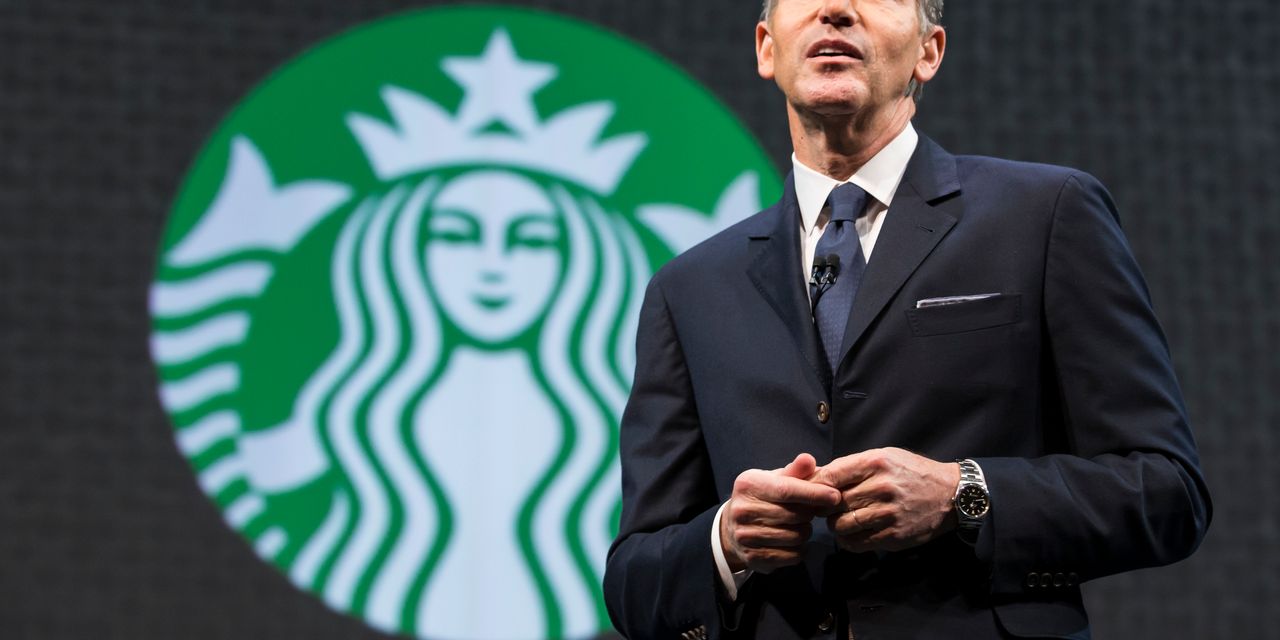Starbucks Corp. on Wednesday said former Chief Executive Howard Schultz is stepping down from its board of directors, capping a nearly 40-year career during which the company grew from a handful of stores in Seattle into a global coffee chain.
Schultz’s retirement from the board, which ends his involvement in the company’s leadership, took effect Wednesday and was part of a planned transition, the coffee chain said. Schultz stepped down as Starbucks
SBUX,
chief executive in March.
The company on Wednesday also said that it had elected Wei Zhang to its board of directors, effective Oct. 1. Zhang was most recently a senior adviser to Chinese e-commerce giant Alibaba Group
BABA,
and also held leadership positions at News Corp China and CNBC China.
Shares of Starbucks were down 0.7% after hours on Wednesday.
Starbucks said Schultz “will now turn his attention with his wife, Sheri, to focus on a range of philanthropic and entrepreneurial investments to create greater opportunity, accessible to all.” The company noted that the two were co-founders of the Schultz Family Foundation in 1996, and of the emes project.
Although he was not technically the founder of the coffee chain, Schultz became the modern face of it. Schultz joined Starbucks in 1982 as its director of operations and marketing. After a brief hiatus from the company, he returned in 1987 as chief executive and bought the business with backing from local investors, according to a biography on the Starbucks website. The chain went public in 1992.
As the chain’s footprint expanded beyond the U.S., Schultz stepped down from the CEO role in 2000 but returned in 2008. He retired from Starbucks in 2018, then came back as interim chief executive and board member last year.
Over those years, Starbucks has banked on China for international growth — even as that country’s economy remains turbulent following the postpandemic reopening. It also added food and cold and customizable drinks to its menus and built out its mobile-ordering infrastructure.
The company has branded itself as a progressive employer and a supporter of social justice. But over the past two years, the company, and Schultz in particular, have faced criticism over the handling of employees who were trying to unionize. Union members have accused the chain of unfair labor practices, retaliation for organizing and delaying contract negotiations, leading to deeper scrutiny from lawmakers.
“We hope this is an opportunity for Starbucks to change course and leave their union-busting behind them,” Starbucks Workers United, the union representing those workers, said Wednesday in a tweet.
Still, even as inflation has eaten into consumer savings, Schultz said coffee has remained an “affordable luxury” for many customers. And Starbucks management said that younger, loyal consumers and customizable drinks would help sustain demand.
According to a filing on Wednesday, Schultz will still be connected to the company in other ways. Starbucks said it would amend Schultz’s retirement agreement from 2018 and continue to provide him and his spouse with security services.
“The security services will be provided for a period of 10 years and will be evaluated on an annual basis,” the filing said. “In recognition of Mr. Schultz’s leadership as the company’s founder and chairman emeritus, the company will also provide Mr. Schultz with the reimbursement of his monthly healthcare insurance premiums.”

